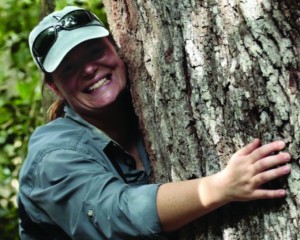Laura Reynolds: Scientist and Advocate

photo provided
Laura Reynolds
Scientists are curious people, constantly searching for answers to questions that often elude others. Laura Reynolds has found the answers she sought out, but she doesn’t think anyone is listening.
Reynolds said since moving to work in Florida as an environmental scientist and conservationist, she has seen how disconnected people are from the problems the delicate ecosystem faces.
“Part of the problem is that many people don’t think about where their water comes form or where it goes,” Reynolds said. “The fishermen in Dade County don’t even realize that the water entering Biscayne Bay affects their catch.”
Reynolds believes change is necessary now for any type of recovery to happen.
“Think about turning on the faucet on the day that no water comes out and then deciding that there’s a problem the needs to be dealt with,” Reynolds said. “We have got to get away from that kind of reactionary thinking.”
For three years, Reynolds has been the executive director of the Tropical Audubon Society, in Dade County. The group operates to conserve all natural resources, including water, and educate members and the public about the delicate relationship we all have with the planet. Years before she took the top position in the non-profit organization, Reynolds served on the Tropical Audubon Society Board of Directors as both the vice president and the chair of education.
“Really, a non-profit tries to take the science and make use of it,” Reynolds said. “If you’re just a scientist in the field and you don’t interact with some of the people that are trying to influence policy then your work just sits there.”
Born and raised in Monticello, New York at the base of the Catskill Mountains, Reynolds was always surrounded by nature, both thriving and suffering. Reynolds said her childhood turned her into an environmentally conscious scientist.
“I got to see the Long Island Sound start to come back from a very bad place,” Reynolds said.
The Sound is an estuary of the Atlantic Ocean between Connecticut, Long Island and New York City that has suffered tribulations with pollution through the years. Reynolds attributes the recovery of the Sound as evidence that restoration is possible from the brink of total pollution.
Her love for the environment spurred questions that she didn’t have the answers to. By age 9, Reynolds realized her life would be spent as a scientist finding those answers.
Laura has worked, researched and taught in Florida since she moved here in 1994. She completed her undergraduate degree in marine and environmental science at Jacksonville University. She sought more science research and her master’s degree in education at the Florida International University while also working as an adjunct professor.
After seeing a divide between people and the land, Reynolds turned her focus from research to education outreach and advocacy.
“I think that universities ought to require some kind of environmental course, whether you’re a major or not,” Reynolds said. “I think it’s so important that people understand that we live above our water supply.”
Reynolds believes a combination of political reform and an educated, conscious public is the only way to save Florida’s ecosystem.
“For the most part people are reluctant to make changes in their life because they don’t think it makes a big difference,” Reynolds said.
Reynolds said she reduces her impact on the water supply by taking shorter showers, using public transportation, Xeriscaping her yard and saving rain water for irrigation through a rain barrel system.
Reynolds believes the transient, non-native population of Florida is a large contributor the state of the water here.
“Unfortunately for Florida, a lot of people were not born here,” Reynolds said. “Their roots are not here and so their actions to protect it are not the same.”
Reynolds said there are some native Floridians trying to preserve the state’s delicate ecosystem, but not enough.
“Development rights are being transferred in the northern Everglades because [natives] don’t want their land to ever be developed,” Reynolds said. “They want to see their family’s legacy continue on. We need more of that. Those are kind of people that can save a community.”

Join the Discussion